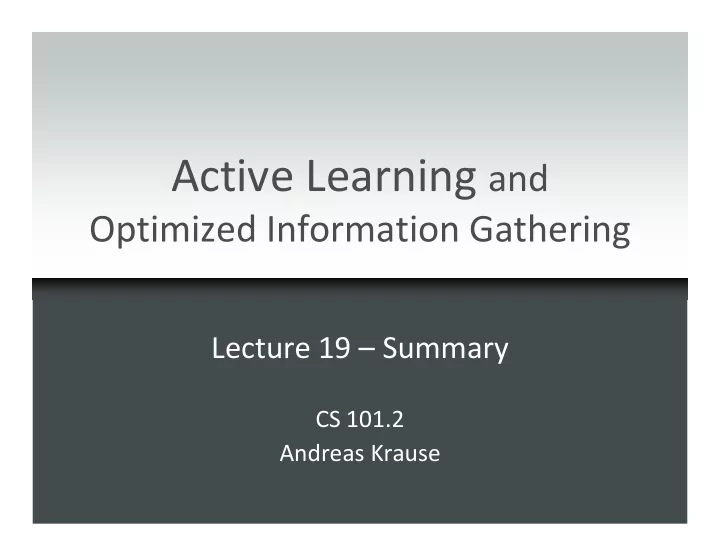

Active Learning and Optimized Information Gathering Lecture 19 – Summary CS 101.2 Andreas Krause
How can we get most useful information at minimum cost? 2
Sponsored search Which ads should be displayed to maximize revenue? 3
Which blogs to read ���� Learn about story after us! Information cascade Which blogs should we read to learn about big cascades early? 4
Spam or Ham? � � � Spam � � � � � � � � � � � � � � � � � Ham Labels are expensive (need to ask expert) Which labels should we obtain to maximize classification accuracy? 5
Automated environmental monitoring ?? Robots collect measurements Limited capacity requires selection 6
Key intellectual questions How can a machine choose experiments that allow it to maximize its performance in an unfamiliar environment? How can a machine tell “interesting and useful” data from noise? How can we develop tools that allow us to cope with the overload of information? How can we automate curiosity ? 7
What you’ve learned in this class Bandit problems, Exploration / Exploitation tradeoffs Online algorithms, regret minimization Reinforcement learning and MDPs Learning theory (PAC learning, VC dimension,...) Active learning (pool-based, label complexity..) Uncertainty sampling Kernel methods (Gaussian processes, SVMs, …) Value of information Bayesian modeling Bayesian experimental design Submodular function optimization Sparsity (Sparse PCA, Compressed sensing, …) Applications (Human learning, robotics, sensor networks, neuroscience, …) 8
Big picture Three types of approaches Online decision making 1. Statistical active learning 2. Combinatorial approaches 3. All approaches specify a goal of the information gathering task a class of queries that can be posed This allows to develop algorithms for selecting most useful information 9
Overview of approaches Approach Goal Queries Online optimization Maximize a noisy Function values at (bandits, experts,…) function selected inputs Active learning for Learn a hypothesis Labels for selected classification (identify function inputs level sets ) Active learning for Estimate a function Function values at regression everywhere selected inputs Bayesian Allow inferences in Subset of variables experimental design prob. model 10
Approaches vary in Assumptions made about the world Bayesian (prior distribution over states of the world) Frequentist (no prior, but iid noise) Adversarial (oblivious, adaptive, …) Adaptivity A priori approaches select all observations before measurements are made Sequential approaches choose observations based on prior observations Multi-stage Guarantees about solutions Regret guarantees Improvement in sample complexity Approximation guarantees for fixed sample size 11
Summary online prediction Natural formalism for studying exploration / exploitation tradeoffs Often, algorithms are very robust: Can deal with adversarial noise Many extensions to practical settings Exploit structure in pay-off function Exploit context dependency (Often) lead to practical algorithms Can only be used for noisy function optimization 12
Summary statistical active learning Only select most useful samples to quickly learn complex hypotheses Can get exponential improvement in sample complexity!! Threshold functions Homogeneous linear separators Can suffer from sampling bias Pool based active learning is a principled way around this Positive results often make strong assumptions For noisy data, often only fallback guarantees 13
Summary combinatorial approaches Select informative variables to facilitate decision making Value of information, Bayesian experimental design Strongest theoretical results for a priori selection problems Can accommodate complex constraints Varying cost functions Informative path planning Lead to very practical and efficient algorithms Have to make fairly strong assumptions (Bayesian prior) 14
Final project Writeup due March 17 (next Tuesday), 11:59pm 8 pages NIPS format Clearly discuss Problem statement Formal model used to address problem Approach used to solve the problem Experimental results / proofs 15
Project Poster Session Tuesday March 17 1pm-2:30pm Second floor Powell-Booth (CACR Atrium) Easels and poster boards will be made available Can pick up poster boards (32” by 40”) on Monday in my office Tell other people to come (will have cookies ☺ ) Will have a best project award (public vote)!! 16
Course feedback Your feedback is important!! What was good, what should be improved? Design of new, machine learning / AI related courses PLEASE fill out Online survey (TQFR) Written form (distributed in class) 17
Recommend
More recommend